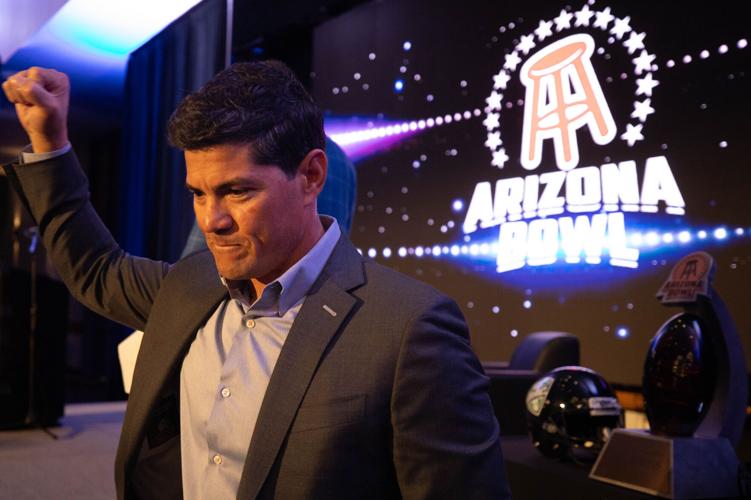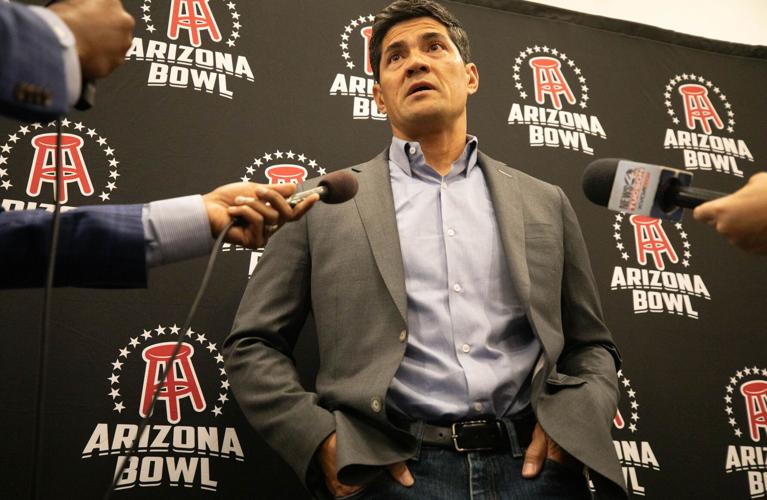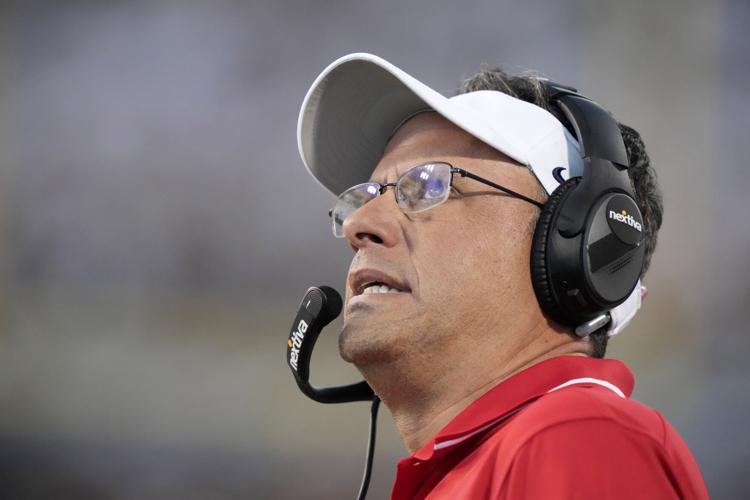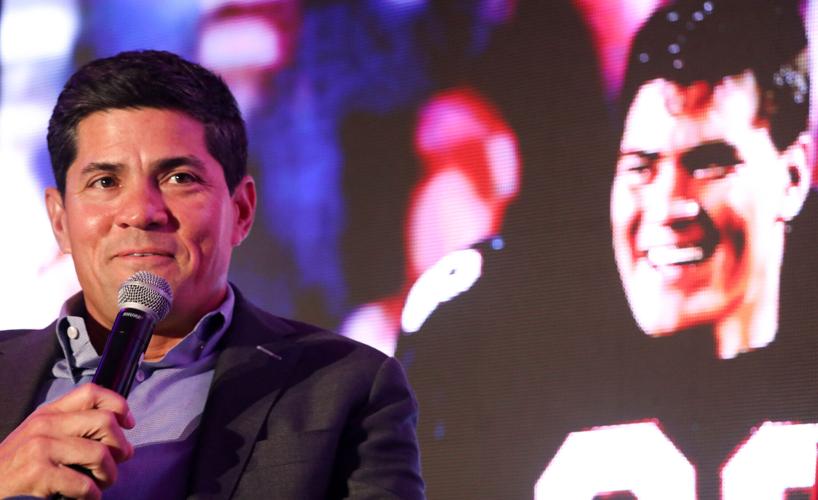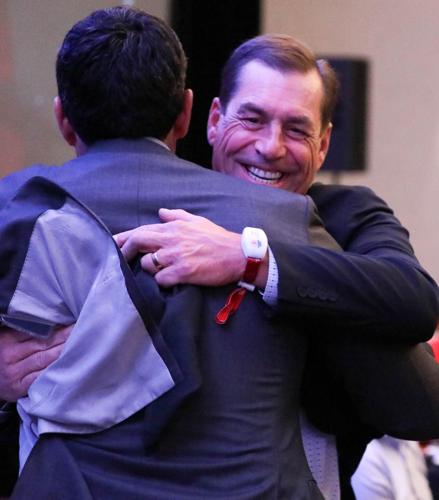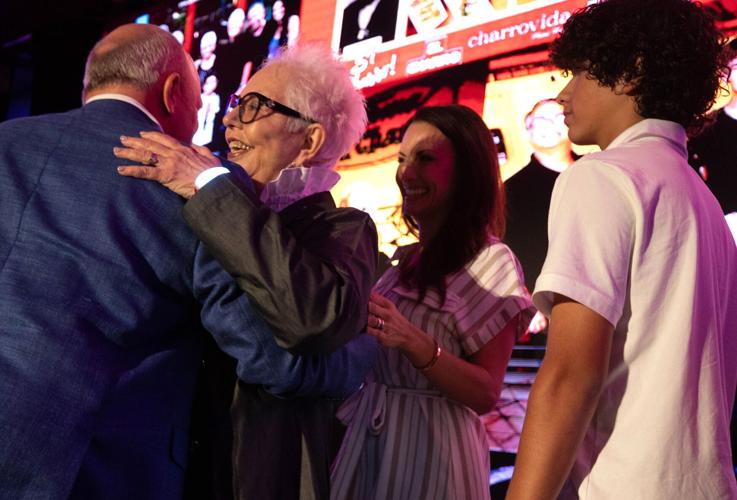Before being honored at the kickoff luncheon for the Barstool Sports Arizona Bowl, Tedy Bruschi greeted sponsors and supporters in a VIP room at the Tucson Convention Center.
Bruschi shook hands. He took pictures. He signed memorabilia. He caught up with Rich Tomey and his wife, Rachelle.

Michael Lev is a senior writer/columnist for the Arizona Daily Star, Tucson.com and The Wildcaster.
Bruschi did it all with a smile on his face.
Moments earlier, Bruschi had his game face on.
He was spicy. He was fiery. He was ready to run to the ball.
Bruschi, who received the Dick Tomey Arizona Strong Award and spoke to a luncheon crowd of about 1,000 Thursday, is an unabashed supporter of third-year Arizona coach Jedd Fisch. Bruschi serves as an advisor to Fisch and has attended practices this week.
Like most others who back the program, Bruschi is thrilled with the progress the UA has made since Fisch took over. But Bruschi isn’t satisfied with close losses and near misses. Nor are the Wildcats, he conveyed. Nor should they be.

Tedy Bruschi speaks with local media before the beginning of the 2023 Barstool Sports Arizona Bowl kickoff luncheon Thursday inside the Tucson Convention Center.
“It’s about time,” Bruschi said. “You could see what Jedd has done with the program. I can recognize and feel the energy when I’m there. It’s just that to make people see it and make people realize it, you have to finish and you have to win. That was a part of my message to the team this week when I spoke to them.
“They understand that. They understand that this program isn’t about close calls and almosts anymore. It’s about finishing and winning football games. And that’s what Jedd and his staff have been working to get to.”
Strong words. Needed words. Accurate words.

Arizona head coach Jedd Fisch looks to the video board for a replay during the first half of the Wildcats’ eventual 31-34 overtime loss Sept. 9 at Mississippi State
Fisch is pretty even-keeled in his interactions with the media. His demeanor doesn’t change much whether Arizona wins or loses. He’s always upbeat. His message has been consistent this season, in which the Wildcats have lost three games by a combined 16 points — two in overtime and two vs. top-10 opponents: We have a good football team, and it’s only a matter of time before that translates into victories.
Fisch seldom if ever publicly expresses the sentiment that Bruschi did Thursday — that close isn’t good enough. But it’s undoubtedly something Fisch says to his players on a daily basis. It’s necessary to push them over that hump.

Tedy Bruschi raises a fist in celebration during the 2023 Barstool Sports Arizona Bowl kickoff luncheon Thursday where Bruschi was awarded the 2023 Dick Tomey Arizona Strong Award at the Tucson Convention Center. This year’s Barstool Sports Arizona Bowl is at Arizona Stadium Saturday, Dec. 30 at 2:30 p.m.
“Getting over a hump for football teams is just the little things,” Bruschi said. “Penalties here, specific plays there. Jedd is teaching them all of this. These are all improvements they’ve worked on this week.
“I spent some great time with the program. They’re doing all the right things. It’s coming.”
Bruschi has been on both sides of the hump. The Wildcats went 4-7 in 1991, his first year with the program. Then 6-5-1. Then 10-2, capped by a win in the Fiesta Bowl.
The year before the New England Patriots won their first Super Bowl, they were 5-11. The year after, they didn’t make the playoffs.
If anyone knows what championship-caliber football looks like, it’s Bruschi, who played for three Super Bowl-winning teams in all. He has worked with Fisch and the program for a little over 2½ years. Bruschi’s role hasn’t change in that time, he said. But the program sure has.
“The upward trajectory of this program is something that they all see inside, internally,” Bruschi said. “I recognize the energy of the players. The players know that they have to make people see what they’re doing here and that you do that by winning football games.”

Tedy Bruschi talks about how his love for the game began at a young age during the 2023 Barstool Sports Arizona Bowl kickoff luncheon Thursday inside the Tucson Convention Center.
Bruschi’s conversation with a handful of Tucson reporters eventually veered into his lane: defense. I asked him what he saw in Johnny Nansen’s group against future pros Michael Penix Jr. and Caleb Williams. Both had their least productive performances of the season against the Wildcats.
“That’s a sign,” Bruschi said.

Tedy Bruschi hugs Dave Heeke, Vice President and Director of Sports at the University of Arizona during the 2023 Barstool Sports Arizona Bowl luncheon inside of the Tucson Convention Center, 260 S. Church Avenue, October 12, 2023.
Then he got fired up.
“If you can’t see the growth, you’re blind,” Bruschi said. “Get your butts in the seats and start watching some games.
“Hearing Jedd have to ask fans in the community to get to the stadium really irritates me. How can you not recognize what’s going on here?” he said. “There’s a head coach that should be talking about the football team and game-planning, and he’s asking fans to get their butts in the seats. I guess I’m doing it for him here because he shouldn’t waste his time to have to do that.”
No arguments here. Attendance has been as depressed as the fanbase in recent years. But it’s been trending up. The Washington game was a sellout. If Arizona can pull off an upset Saturday at Washington State, fans will get their butts in the seats for the rest of the home slate.

Tedy Bruschi became a defensive force during his time anchoring Arizona’s “Desert Swarm” defense in the 1990s.
Would they travel to a bowl game? That’s only been a hypothetical in these parts since 2017.
I asked Bruschi what it would mean for the program if the Wildcats were able to make a bowl this year.
“If?” he shot back.
I suddenly felt like a quarterback about to be on the wrong end of a Bruschi blitz.
He continued.
“It’s time,” he said. “The kids, the players, they know. That’s not all they want. They want a good bowl game.
“They’re not satisfied with close. That USC thing was close. ‘Wow, good job.’ Don’t accept (those) pats on the back. And I don’t think they want it, being around them this week. They want to do more than what the expectations are here.
“I haven’t been in the community on a regular basis, but I can see how maybe their expectations are probably lower than what they are in that building. They want wins, of course, but these kids don’t just want to win. They want to dominate, and they want to do it on a consistent basis. That better equal a bowl game this year.”

Tedy Bruschi stands as the crowd applauds him at the beginning of the 2023 Barstool Sports Arizona Bowl luncheon inside the Tucson Convention Center, 260 S. Church Avenue, October 12, 2023.
Are our collective expectations too low for UA football? Maybe. With all due respect to Bruschi, context must be considered. The 2017 Foster Farms Bowl was a long time ago. A 20-game losing streak happened in the interim.
But the way Bruschi talked about the team — all the future NFL talent he saw — has me recalibrating.
The 2023 Wildcats will make a bowl game. And not just any bowl game. A good one.

The Flores family accepts the Jon and Heather Volpe Tucson Strong Award on stage during the 2023 Barstool Sports Arizona Bowl kickoff luncheon Thursday afternoon in the Tucson Convention Center. The Flores family are the creators of Flores Concepts, which includes three El Charro locations, Charro Chico, Charro Steak and Del Rey, The Monica, and Charro Vida.


